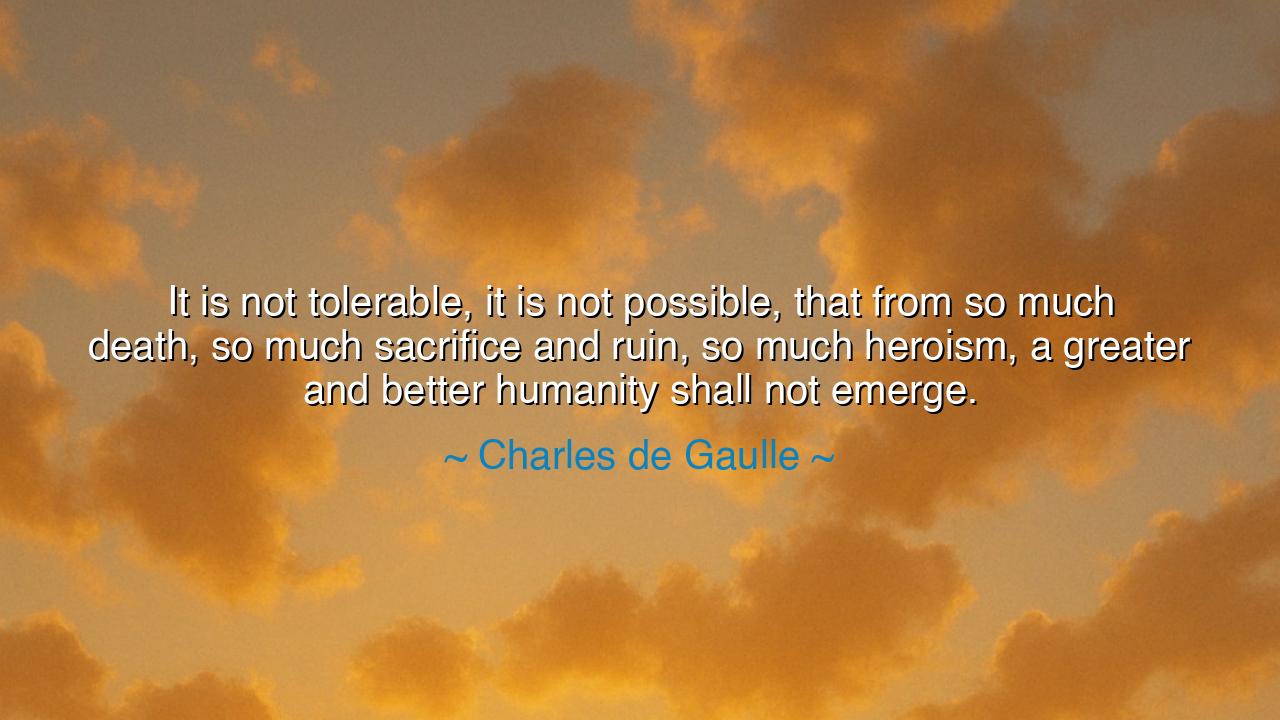
It is not tolerable, it is not possible, that from so much death
It is not tolerable, it is not possible, that from so much death, so much sacrifice and ruin, so much heroism, a greater and better humanity shall not emerge.






“It is not tolerable, it is not possible, that from so much death, so much sacrifice and ruin, so much heroism, a greater and better humanity shall not emerge.” – Charles de Gaulle
There are words that arise not from comfort, but from ashes—from the heart of ruin, when the world stands trembling between despair and rebirth. Such were the words of Charles de Gaulle, spoken amid the wreckage of war, when the old world had collapsed and a new one struggled to rise. His voice, steady as iron yet burning with faith, declared that the blood and sacrifice of millions could not be in vain. He saw beyond the graves and the rubble; he saw the seed of renewal that pain itself had planted. His words are a vow to all who have suffered—that from death, sacrifice, and ruin, something greater must be born, or else humanity itself would perish not by the sword, but by the loss of meaning.
De Gaulle’s quote was forged in the crucible of the Second World War, when the world had endured horrors beyond imagination. Cities lay in ashes, families were broken, and faith in civilization itself hung by a thread. Yet amid this darkness, there were acts of heroism so luminous that they outshone the fire of destruction—the resistance fighters who risked their lives in silence, the soldiers who stood their ground against impossible odds, the mothers who endured hunger to keep their children alive. De Gaulle, leader of Free France, stood as the voice of a people who refused to kneel. When he spoke these words, he was not merely comforting his nation; he was summoning all humankind to remember that suffering must bear fruit, that out of agony must come wisdom and rebirth.
For he understood a truth known to the ancients: that tragedy, if endured with courage, becomes transformation. The Greeks taught that from great suffering comes catharsis, a cleansing of the soul. The Christians believed that from the agony of the cross came the salvation of the world. So too did de Gaulle believe that the torment of his century must awaken a better humanity—one that learns to cherish peace, to defend justice, to see the divine in the dignity of every life. For if mankind endures suffering yet learns nothing from it, then death reigns twice—once upon the body, and again upon the soul.
Consider the rebuilding of Europe after the war—a continent scarred by hatred, yet determined to rise anew. Nations that had once spilled each other’s blood came together to build the European Union, born not of conquest, but of cooperation. Enemies became allies; fields that once burned with artillery now blossomed with harvests. This was the vision de Gaulle foresaw—a civilization stronger for its trials, wiser for its pain. The heroism of soldiers and civilians alike found its echo in the creation of peace. It was proof that from ashes can come renewal, if men and women choose to honor the fallen by becoming better than before.
But the warning in de Gaulle’s words is as important as the hope: it is not tolerable that such suffering should end in forgetfulness. If the memory of sacrifice fades, if humanity grows comfortable and careless again, then the lessons of the dead are lost. History will repeat its horrors until men learn to remember with reverence. Ruin is not only destruction—it is a summons, a call to rebuild not only cities, but souls. The blood shed in war cries out not for vengeance, but for understanding, for a world where heroism is no longer born of desperation, but of compassion and wisdom.
O children of the future, take this teaching to heart: when you look upon the ruins of history, do not turn away. See in them not only sorrow, but the seed of greatness. When life brings you loss or hardship, let it not destroy your spirit, but refine it. As iron is forged by fire, so too is character shaped by adversity. Be among those who make suffering meaningful—by turning pain into progress, fear into courage, despair into hope.
The lesson is eternal: from every darkness, light must arise, or the darkness will devour all. From every war, a deeper peace must be born, or the war will never end. When the world seems lost, remember the words of de Gaulle—that it is not tolerable, it is not possible, that so much courage and sacrifice should vanish without leaving behind a greater humanity. Let that humanity begin with you—with every act of kindness, every stand for justice, every effort to heal what others have broken. For in doing so, you fulfill the promise spoken in the ashes: that from death, there shall indeed come life.






AAdministratorAdministrator
Welcome, honored guests. Please leave a comment, we will respond soon